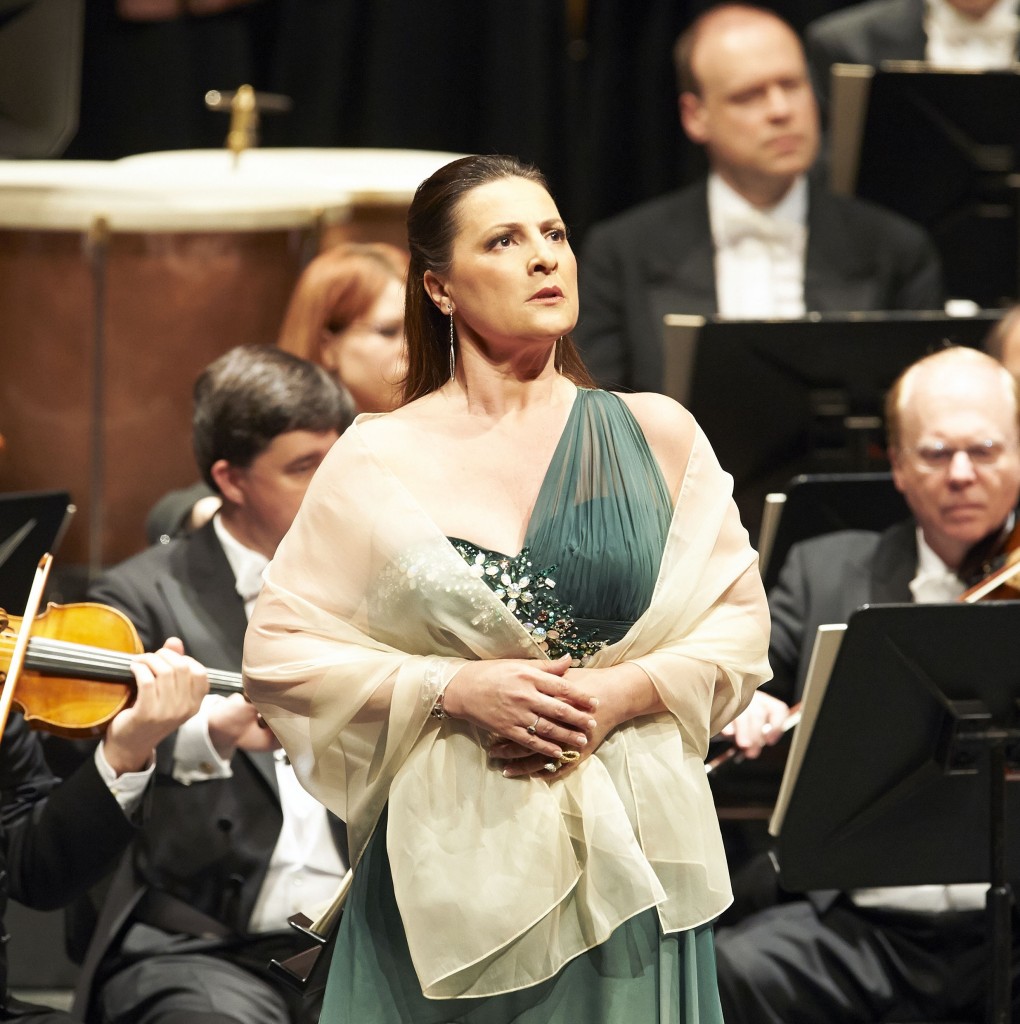 Another dream come true in Vienna, the city of dreams? This one’s at Vienna State Opera: Edita Gruberova, legendary in the title role of Bellini’s Norma, had to cancel due to a broken leg. It’s the fairy tale of the diva giving a younger artist a break. Sounds familiar -remember The Boy Friend, Ken Russell’s 1960s film, where Glenda Jackson has to sit in the audience and watch her understudy (Twiggy) steal her part? As Norma, Maria Pia Piscitelli opened with warm, if lukewarm reviews, and gradually made the role her own.
Another dream come true in Vienna, the city of dreams? This one’s at Vienna State Opera: Edita Gruberova, legendary in the title role of Bellini’s Norma, had to cancel due to a broken leg. It’s the fairy tale of the diva giving a younger artist a break. Sounds familiar -remember The Boy Friend, Ken Russell’s 1960s film, where Glenda Jackson has to sit in the audience and watch her understudy (Twiggy) steal her part? As Norma, Maria Pia Piscitelli opened with warm, if lukewarm reviews, and gradually made the role her own.
Don’t let the plot put you off Bellini’s masterpiece! As Pollione, Massimo Giordano- world-famous, who was billed – a supple tenor with rich timbre- sings to Flavio, Norma serves the bloodthirsty Druid’s god as priestess. Her anger was revealed to him in a dream. (Freudian guilty conscience, he’s swopping her for her younger initiate Adalgisa.) Giordano sings, he was standing at the altar of Venus- orchestra almost jaunty, with syncopated rhythms- intoxicated with love and desire. Then ‘a shadow came between us’, he’s enveloped by a Druid’s cloak. (Cymbals and chorus build up to anticipate the arrival of Norma.) But Pollione boasts to Flavio, he’s protected by a power greater than hers. Giordano’s tenor is like a full-blooded red wine, glorious, affirmative.
There a lot of orchestral intermissions in Bellini. Introducing Norma, Oroveso (distinguished bass Dan Paul Dumitresco) announces Norma carries her hair wreathed in verbena, the snake held in her hand gleams… Not in this concert (Konzertant) performance. Maria Pia Piscitelli, in a long green dress is standing facing the audience. Has the Roman eagle not defeated their land (Dumitresco’s bass powerful, authorative). But for her the time for revenge has not arrived. ‘What has the god revealed to you,’ now demand the Chorus.
Norma, (in her seminal aria Casta Diva ) sings ‘Keep the Peace’ repeatedly to gorgeous, soaring notes. Now, her aria introduced by a flute, Chaste goddess, temper their zealous hearts and this fervent passion. Spread on earth the same cloak of peace that prevails in heaven… This sublime aria should be obligatory listening for soldiers before going into battle!
Now the holy rites over, the orchestra has a military swagger: when the gods demand the Romans’ blood, let the first blow fall. But Norma sings she’ll be unable to punish him. Norma’s inner conflict is between her duty and her private passion. Piscitelli sings tenderly, Ah! bello a me ritorna Oh, beloved, bring back the beauty of our first love; I will be your defence against the whole world. Piscitelli’s Norma is not quite the measure of this complex, impassioned Elizabeth- ‘Virgin Queen’ figure. (Anyway, Norma has consummated her passion, and has children by him.) But Piscitelli, constantly improving, gets even better.
As Adalgisa, Nadia Krasteva, a latin beauty, holds her hair alluringly, looks around. She’s smouldering, in her aria, How that Roman made her transgress her vows. A little hope! An irresistible force drives her back for more! Then she pleads, ‘Oh, God protect me: I am lost, take pity on me.’
Giordano’s Pollione appears. She should pray to the god of love, not the altar. And what of our love?- She’s renounced it, sings Krasteva defiantly. Giordano, engagingly powerful, Go, heartless woman! Offer your cruel god my blood as sacrifice. Then, as if retracting, even if every drop of blood spills, he cannot leave. ‘Only you were promised : God gave your heart to me.’ She sings of the grief he’s caused her: her distress standing before the divine altar. Now Giordano rising emphatically: Would you really leave me, Algadisa? Krasteva emotionally overwrought, she’ll come with him. Your love gives me confidence: together they’ll be strong.
In the first of the two powerful duets between Piscitelli and Krasteva, Adalgisa unburdens her heart to Norma, unaware that it’s Pollione she loves. Norma filled with compassion, releases her from her vows. Adalgisa brings back memories; the same thing happened to her. But which man is your lover? Learning it’s Pollione, Norma reveals her own secret affair, Adalgisa aghast. Piscatelli, in an impressive display of coloratura, insists ‘She is innocent! Tremble you vile rogue!’
Norma confronts Pollione, she is the victim of a vile deception. He taunts Norma, spare your reproaches- which of us is the guiltier? Giordano, smooth, potent- invites, Come Adalgisa – his tenor gloriously surging. But Adalgisa rejects him, Norma curses him.
In Norma’s aria opening Act 2, she considers killing his two children Dormono entrambi. Yet they must not die, they are her children! Piscitelli’s range seemed lacking; but she has warmth and fully engages. Adalgisa is summoned, Norma, contemplating suicide, begs her to take her boys with her to Rome. 
The second of their duets is a stand-out triumph for Piscitelli and Krasteva. In Norma’s aria -Take them , protect them, allow your heart to be moved – Piscitelli sustains superb high notes. But Adalgisa has another idea: offers to persuade Pollione to return to Norma, (Krasteva, now in black gown, pointing to Norma’s little children.) These two ladies are superlative in duet, playing off each other, bringing out heir best qualities. ‘Relent! I loved him; but now!’-‘I shall be with you until the final hour.’ -‘With you I can defy life!’ The women pledge their solidarity; all girls together. Quite outstanding!
In this second Act, Piscitelli, noticeably thaws, her facial gestures more expressive, against that immobile priestess, opening scene, addressing her people. Now her soprano rises to sublime heights. ‘Roman blood will flow like a river!’ Crashing percussion; the bell is sounded. Chorus demand to know what has happened. What, a bloodbath? but before she called for peace. The Chorus- Vienna State Opera’s magnificent in Italian repertoire- thunder Guerra, guerra : War! Will she complete the rite? Who will the sacrifice be? Pollione is arrested for attempting to abduct Adalgisa.
In Norma’s scene with Pollione, finally, left to question him, he is in her hands. She offers him freedom if he gives up Adalgisa.- Giordano, defiantly, No he’s not that weak; no one can break their bonds; he refuses to renounce Adalgisa. But her wrath is greater than his love.
Piscitelli is quite into the part. The Romans shall be slaughtered in their hundreds; kill me but have pity on her, she insists. Piscitelli seems to have found hidden reserves. Her soprano seems to have matured, strengthened. An astonishing improvement. He’ll be adequately avenged when she dies before him. Can I accuse an innocent woman of her crime? Norma announces to her people, a priestess has betrayed them. ‘Norma!’ sing the Chorus in hushed shock, ‘You are a sinner!’ Then, variously, ‘We do not believe her’, ‘What a disgrace!’ In Norma’s aria- ‘May this terrible hour show you who you’ve betrayed. In vain, he attempted to flee- Piscatelli renders with such passion. Chorus sing, ‘Compose yourself, reassure us’; she, insistently, I am the guilty one. Too late, Pollione now sees hers as a transcendent woman. In his remorse, his love is rekindled.
Something really special has happened in the last performance of Piscitelli’s debut as Norma: a stand-in for Gruberova. It’s what makes live opera magical. She pleads to save her children; don’t make them die for her sins. Piscitelli’s face is contorted with distress and emotion. She will perish on the pyre; he will join her, inspired by her courage.
The long orchestral and the prominence given to the choral parts make this a logical choice for a concert performance (Konzertant) , with Vienna State Opera orchestra actually on stage with rows of Vienna’s chorus behind. The conductor Andriy Yurkevych was competent, but not of the best; but these musicians and singers. P.R. 17.05.2014
Photos: Maria Pia Piscitelli (Norma); Nadia Krasteva (Adalgisa) and Maria Pia Piscitelli
(c) Wiener Staatsoper/ Michael Poehn
viennaoperareview.com
Vienna's English opera blog
